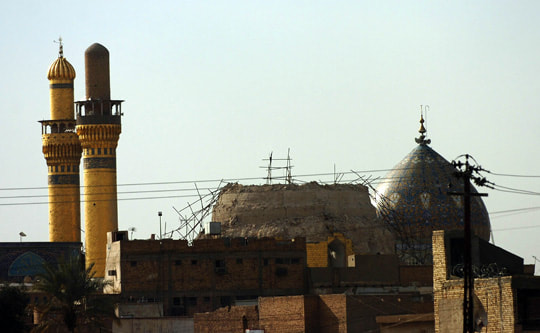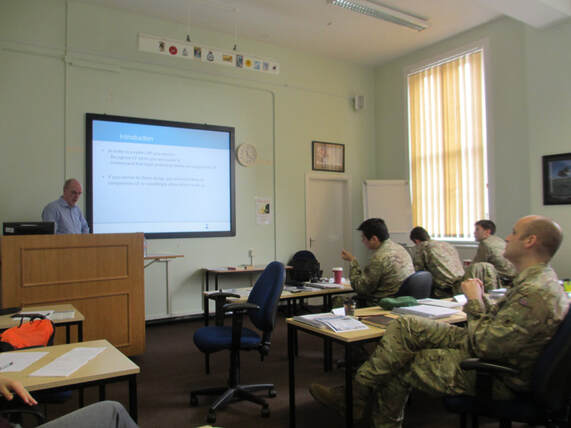LACK OF AWARENESS
A considerable amount of heritage has been damaged and destroyed by fighting simply because the armed forces were not aware of it, or of its importance.
This is also an issue during disaster response, where first responders, for example, have cleared away the remains of damaged cultural heritage sites that could have been saved.
Mitigation: A number of factors have worked to change this and increase awareness. Amongst armed forces this includes:
This is also an issue during disaster response, where first responders, for example, have cleared away the remains of damaged cultural heritage sites that could have been saved.
Mitigation: A number of factors have worked to change this and increase awareness. Amongst armed forces this includes:
- the negative press following the destruction of heritage in Iraq after the 2003 invasion by Coalition Forces, and the widespread coverage of heritage destruction in Syria;
- the increased violence in Iraq after key heritage sites were destroyed by insurgent forces;
- the loss of community goodwill towards the deployed forces in Afghanistan after some sites were accidentally damaged by the US Army;
- the positive news coverage of NATO’s heritage protection during Operation Unified Protector in 2011;
- the raising of awareness by organisations like the Blue Shield.
- Organisations like the Blue Shield are working with the Red Cross at the national level and the ICRC internationally to raise awareness, and organisations like ICCROM and the Smithsonian Cultural Rescue Initiative are carrying out training with first responders.
- However, awareness raising amongst first responders is only just beginning.
The Al-Askari Mosque, Samarra, Iraq, before and after the 2006-02-22 bombing (but before the minarets were fully destroyed on 2007-06-13). Many mosques were bombed in reprisal bombings and there were significant troop and civilian causalities. The incident also caused major ongoing complications for the deployed troops.
Left: Toushiro, Wikimedia Commons/ Public Domain. Right: U.S. Army photo Wikimedia Commons/ Public Domain
Left: Toushiro, Wikimedia Commons/ Public Domain. Right: U.S. Army photo Wikimedia Commons/ Public Domain
Since the recent conflicts in Afghanistan and Iraq, most western military forces have accepted that warfare has changed and that troops require a much greater understanding of the place and population where they are deployed than previously considered necessary. NATO, for example, has developed what it calls its ‘Comprehensive Approach’ in which a better understanding of culture and cultural property can be seen as a ‘force multiplier’ – something that helps the work of deployed troops. Cultural property protection may not win occupying troops more friends; but it can prevent them from making unnecessary enemies. With this change in mindset has come a realisation within armed forces that partnership with heritage experts is essential. Following environmental disaster, as well, the military need to know if there are particular issues to take into account – for example, what can be cleared up immediately and what should be left for later expert attention.
In 2003, Professor Peter Stone was approached by the British Army to advise on heritage protection in Iraq - just 6 weeks before the invasion began, when planning was already completed. Always adamant that he had been the wrong person to ask, but was better than no-on at all (the offered alternative), he would later write of the experience:
|
"In retrospect, my role, originally identified by a group of ‘sharp-end’ military personnel as an attempt to limit unintended UK MoD damage to or destruction of archaeological sites, became essentially a political one. A role that enabled Tony Blair, the Prime Minister who had taken the UK to war in support of his close ally USA President Bush, to stand in Parliament confirming that his government had taken advice on (at least) the identification and protection of the archaeological heritage in Iraq. To my mind as I write, this came perilously close to the then Prime Minister misleading Parliament (advice taken from the wrong person, too late, and by implication essentially pointless for the protection of cultural property during that invasion). Third, as I learnt more in those early months of 2003, it became absolutely and appallingly clear that none but the most basic thought had been given by political or military planners regarding the protection of any cultural property in Iraq, nor had any grasped even the most basic understanding that their cultural property might be important to the people of Iraq and that failure to protect it might have serious negative implications for the Coalition (and see Ricks 2006; Rothfield 2009). This was an enormous failing at political, strategic, and operational levels: an abdication of practical and ethical responsibility."
|
Stone has spent his career since raising awareness around the world to avoid a repetition of the destruction of heritage seen in Iraq during and following the 2003 invasion, and lobbying for ratification and implementation of the 1954 Hague Convention. As part of this, he went on to co-found Blue Shield UK in 2012, and was elected President of the Blue Shield Movement in 2020.
|
Training by Blue Shield UK and Accordance Associates for members of the British Army in Cultural Property Protection in 2019. The slide reads:
Introduction
© BSUK
|
See key documents on Cultural Property Protection and the military in the Document Library of the BSI website



